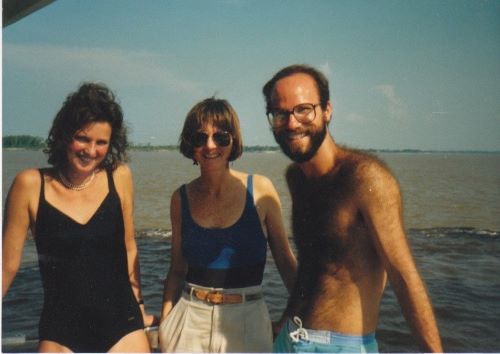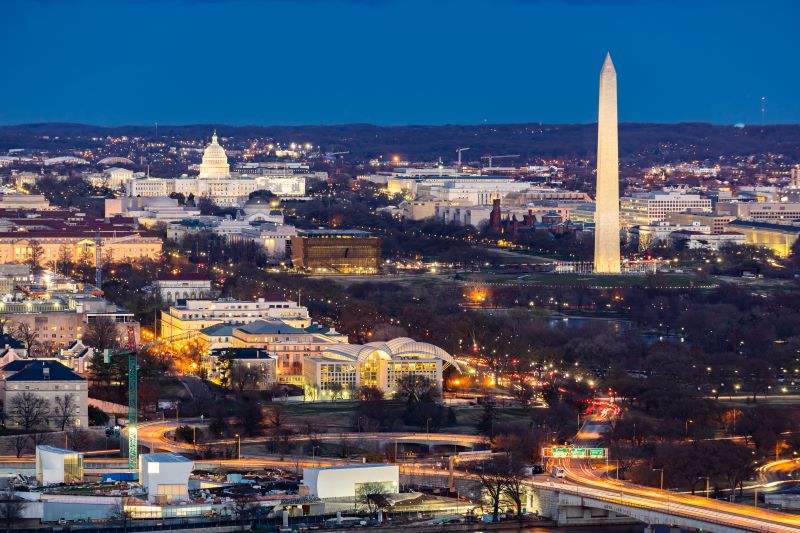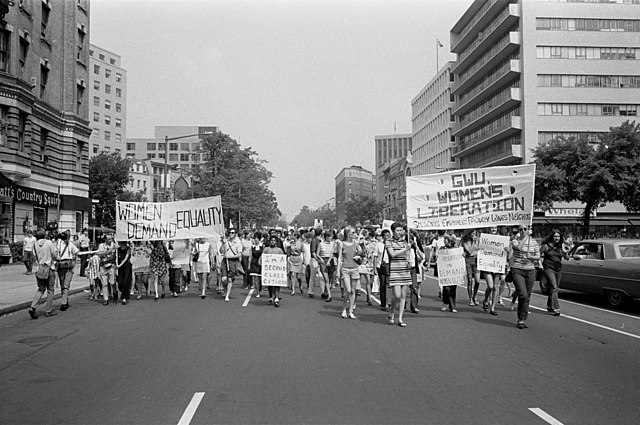Recommended
This piece is the fourth in the series “Episodes in the Life of an American, Woman, Development Economist.” Future episodes will be posted over the coming months.
To join the mailing list for future episodes, fill out this form or contact nancy'slife@cgdev.org.
“Exorbitant privilege” refers to the economic benefits the US captures as home of the dollar – the world’s largest reserve currency.[1] Behind dollar dominance has been US geo-economic dominance of the free world since the closing years of World War II – a level of dominance fully recognized at the founding of the World Bank and the IMF at Bretton Woods in 1944, when the US obtained certain privileges in the governance of those institutions reflecting its outsize wealth and power. The story below tells how 50 years later, as an American,[2] I benefited from one of those privileges—“exorbitant” for me—when I was picked to serve as the executive vice-president of the Inter-American Development Bank.
The story opens in the summer of 1990, when I became the head of a small technical division on environment in the Latin America region of the World Bank. The vice-president of the region told me (in so many words) he wanted an economist to take charge of what he saw as a “too-green” group. I resisted leaving a group I was heading at the time that worked on health and education in Brazil, where I had great colleagues trying to make a small dent in the poor state of basic social programs in Brazil’s Northeast Region.[3] Moreover, I had no serious background in environmental issues – though knowing Brazil, I was aware of the difficult politics there of protecting its Amazon forests, perhaps the biggest single environmental challenge in the Latin America region, and had seen those forests’ wondrous beauty the year before, when our family’s week-long visit to Brazil included a three-day boat ride down the Rio Negro to where it meets the Amazon River (the spectacular “Meeting of the Waters”) near the city of Manaus in the state of Amazonas.
But I had no real choice about the move, and so I proposed and got a three-month paid leave to learn some environmental economics.[4] I “visited” at Resources for the Future, the top environmental think tank in Washington for economists (working mostly on US issues) and worked with Andrew Steer, then leading preparation of the World Development Report on Environment and Development, which became the World Bank’s contribution to the 1992 United Nations “Earth Summit” in Rio de Janeiro, Brazil.[5]
As it turns out, I was lucky to be pushed to take on environment (while recognizing that luck is often the daughter of privilege).
Meanwhile, that same summer of 1990 the United States was hosting the G7 Summit in Houston, Texas. The Germans, Canadians, and other G7 heads of state were keen on announcing some concrete commitments on climate (then mostly called “global warming”), but the Bush administration (George H.W. Bush) resisted—global warming was not a Republican issue. A compromise included a commitment to address deforestation in the Amazon. The World Bank (as the US wanted) and the European Commission (as Germany wanted) were to work together to develop a program of forest protection and to raise money to finance the program from G7 members and other donors.
Inside the World Bank, the responsibility at the working level came down the line to me in that new job as head of the Latin America environment division.
So, in October of 1990, with a trusted colleague I was lucky to recruit away from the health/education group, and an expert in the “green” division on environmental issues and on Brazil (who later became the head of the International Union for Conservation of Nature[6]), I was back in Brazil to work out a program to take back to the G7. The environment ministry was pleased with the possibility. The foreign affairs ministry was not: the future of the Amazon was a sovereign matter; the G7 was out of line.
And I was back to Manaus, where after a bit of tourism the Brazilians took us on a river trip as a briefing on the potential and the problems in the Amazon region. We listened and talked, and visited villagers subsisting along the river (me noting the kids had little schooling and the villagers unattended health problems). Over the course of the following 13 months, my colleagues worked out the politics in the capital, Brasilia; developed a program the Brazilians could agree to; and with me tagging along to the pledging session in Geneva, Switzerland, extracted from Germany, the EU, the UK, the Dutch. . . and the US (in that order of contributions and enthusiasm) a total of $250 million.[7]

With Maritta Koch-Weser and Bob Kaplan in Brazil, October 1990
The next year, in 1991, Lawrence Summers[8] (hereafter LS) was appointed chief economist of the World Bank; in that role he was responsible for ensuring the quality of that upcoming 1992 World Development Report on Environment and Development mentioned above.
He decided he ought to see the Amazon. He called me up (I don’t think we’d met) to arrange an Amazon visit; I was, after all, the chief of the Environment Division in the Latin America region. So, in short order, along with Amazon-savvy colleagues (and my older daughter, then 18) I spent two- or three-days helicoptering around with LS – visiting with rubber tappers, indigenous people, and farmers who’d burned down the forests to grow soy and lift their families out of poverty. And as LS said at the time, seeing a “lot of trees.” He also agreed at my urging to spend one day visiting the favelas in Rio.
Later that same year, LS promoted me to director of the Policy Research Department at the World Bank – despite, he told me, my not being on the World Bank personnel department’s eligibility list for that position. I have no idea whether that Amazon visit mattered. In this case I was thrilled. The Policy Research Department[9] had at the time about 75 research staff, mostly economists, doing relatively independent research on every sort of macro and micro issue affecting the prospects of developing countries. William (Bill) Easterly was there, and Branko Milanovic, and Alan Gelb, all now luminaries in development economics. After three years working on World Bank “operations,” I could return home to research, and to less travel – my youngest of three children was then just five. And I became one of just two, maybe three, women at the director level in the 1991 World Bank
Another year later, in late 1992, LS took leave from the World Bank to work on the Clinton campaign, and then, in early 1993, became undersecretary for international affairs at the US Treasury. That turned out to be still another bit of luck for me.
Some readers will know that since its founding at Bretton Woods, World Bank presidents have been, in effect, chosen by US presidents. The United States, by outdated custom arranged in 1944 at the founding of the World Bank, and at times with unapologetic use of its power and resources to dissuade other member countries from supporting alternative candidates, has ensured for almost seven decades that its nominee for World Bank president is always elected.
Less well known is that the US has the same customary privilege in the case of the executive vice-president of the Inter-American Development Bank (IDB).[10] For that IDB position it is the undersecretary for international affairs at the US Treasury that makes the choice. So it was that LS nominated me.[11] The president of the IDB has been by tradition a candidate from Latin America—and much contested among countries of Latin America over the years.[12] The executive vice-president has been, well, someone the undersecretary at the US Treasury chooses.
That meant for me another promotion and this time a very big one; the executive vice-president is the chief operating officer and chairs the Loan Committee (and has a driver—which I said no thanks to, as I would continue commuting by bike, and a large executive office that she can have redesigned to suit her taste, and top staff she picks, and so on). And thanks to LS, I became the first woman in the multilateral bank system at that deputy level.
So for me, a bit of luck (pushed to the Environment Division) followed by another bit of luck (LS becomes undersecretary at the US Treasury) plus a big dose of specifically “American” privilege—a version of an outmoded privilege I later often and publicly decried in the case of the World Bank president[13]—landed me in what turned out to be a fantastic job. Thus luck born of privilege compounded my born-in-America luck and privilege.
Comments welcome.
Email me at nancy'slife@cgdev.org if you wish to be added to a mailing list
Find me on Twitter: @nancymbirdsall
[1] Explained by Ben Bernanke, a former head of the US Federal Reserve. https://www.brookings.edu/blog/ben-bernanke/2016/01/07/the-dollars-international-role-an-exorbitant-privilege-
[2] Apologies to residents of other countries in the Western Hemisphere. Using the adjective “American” to refer to citizens of the US is unreasonable – another undue privilege! But the alternatives are awkward: USAn?
[3] On the small dent in a huge deficit, see Opportunity Foregone: Education in Brazil , Johns Hopkins Univ Press, 1996, with Richard H. Sabot.
[4] I had learned it pays to ask, especially for women (men do it anyway); see episode 3 in this series.
[5] Andrew Steer later became the head of World Resources Institute and now works with Jeff Bezos at Bezos Earth Fund. By 1993 I had learned enough from him to co-author with him a short article on the appropriate discount rate to use in cost-benefit analysis of reducing carbon emissions: Birdsall and Steer, “Act Now to Reduce Global Warming But Don’t Cook the Books”, Finance and Development, Vol 30, No.1.
[6] Bob Kaplan, a lifelong friend who headed the World Bank’s work on what became the Pilot Program to Conserve the Brazilian Rainforest (https://documents1.worldbank.org/curated/en/882571468225309829/pdf/455190WP0BOX0334106B01PUBLIC1.pdf), and Maritta Koch-Weser, an anthropologist who had spent many years working on environmental issues in Brazil, and later became head of the International Union for Conservation of Nature.
[7] About $550 million today. $50 million went to a World Bank-managed trust fund. The rest was pledged in the form of commitments by donors to cofinance with Brazil specific projects to be agreed. The resulting program was critical less for the size of financing than for the emphasis on funding nongovernmental groups in Brazil – over the years a hugely important contribution to civil society and to strengthening local movements to save the forest, protect the rights of indigenous peoples, and support Amazonian people engaging in sustainable productive activities. See this World Bank document: https://documents1.worldbank.org/curated/en/880921468238160692/pdf/9241002005Dec10t0PUBLIC0Box0385367B.pdf
[8] Summers later became secretary of the Treasury during the Clinton presidency and head of the National Economic Council during the Obama Presidency; he is now the Charles W. Eliot University Professor at Harvard University, and Chair of the Board of CGD.
[9] It was then called the Country Economics Department. Once there I managed the name change.
[10] And on vice-president at the Asian Development Bank where, as at the World Bank and the IDB the US is the largest single shareholder.
[11] This belies the view that Lawrence Summers has not supported women; it is one of many exanples.
[12] The Trump administration nominated a US citizen for the first time in 2020, violating the understanding that the IDB president would always come from a borrowing country in the region; a Honduran now holds the position of executive vice-president. Time will tell whether this is anomalous or the beginning of a breakdown in the arrangement agreed at the 1959 founding of the IDB, which was an adaptation for the first regional bank of that agreed for the World Bank in 1944.
[13] E.g., in this blog post, decrying the lack of competition in the selection of World Bank presidents by in effect the White House, and its costs: https://www.cgdev.org/blog/may-best-woman-win-world-bank
Rights & Permissions
You may use and disseminate CGD’s publications under these conditions.



